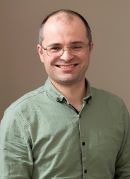 Seth Wayne Dickey, Ph.D.
Seth Wayne Dickey, Ph.D.
8075 Greenmead Drive
Room 1208
College Park, MD 20740
Office: 301-226-2757
Email: sdickey@umd.edu
Research goals
Antimicrobial resistance (AMR) among bacterial pathogens claims millions of lives and cost billions of dollars every year. New targets and strategies are desperately needed to blunt the societal impact of AMR on human and animal health. The Dickey lab employs bacterial genetics, molecular biology, membrane and protein biochemistry techniques to understand the physiology, virulence, and antibiotic resistance of pathogenic bacteria as well as the mechanisms of new antimicrobials.
Current Projects:
Novel antimicrobials: We are focusing on understanding the mechanisms and biosynthesis of a new class of antimicrobials.
Pathway analysis: Nearly a quarter of the MRSA genes encoded in the core genome are poorly understood. We are developing advanced genetic approaches to probe this dark genetic matter with the goal of identifying new therapeutic targets or informing combinatorial treatment approaches.
We are looking for a qualified and independent postdoctoral fellow to develop advanced genetic techniques to investigate pathways of methicillin-resistant Staphylococcus aureus. If interested, please send your CV and a list of three recommenders to sdickey@umd.edu. A one-page career statement is encouraged as well.
Professional Appointments
2022-present Assistant Professor
Department of Veterinary Medicine, University of Maryland, College Park
Virginia-Maryland College of Veterinary Medicine
Education and Training
2014-2022 Postdoctoral fellowship, National Institute of Allergy and Infectious Diseases; Advisor: Michael Otto, PhD
2007-2014 Ph.D., Johns Hopkins University School of Medicine; Molecular Biology and Genetics Advisor: Sinisa Urban, PhD
2003-2007 B.S., Michigan State University, East Lansing, MI; Biochemistry and Molecular Biology
Advisor: John Wang, PhD
Grant Funding
2016 Fi2 postdoctoral research award, Mechanism and inhibition of a Staphylococcus aureus toxin transporter. NIGMS, Project Number:1FI2GM119991 NIH RePORTER hyperlink
Publications
PubMed Hyperlink
2023 Seth W. Dickey, Dylan J. Burgin, Steven Huang, David Maguire, and Michael Otto. Two transporters cooperate to secrete amphipathic peptides from the cytoplasmic and membranous milieus. Proceedings of the National Academy of Sciences of the United States of America. 2023 Feb 21;120(8):e2211689120. doi: 10.1073/pnas.2211689120. Epub 2023 Feb 14. PMID: 36787359; PMCID: PMC9974410. https://www.pnas.org/doi/10.1073/pnas.2211689120
2020 Natalie Zeytuni*, Seth W. Dickey*, Jinhong Hu, H.T. Chou, Liam J. Worrall, J. Andrew N. Alexander, Michael L. Carlson, Michael Nosella, Franck Duong, Z. Yu, Michael Otto, and Natalie C. J. Strynadka, (2020) Structural insight into the Staphylococcus aureus ATP-driven exporter of virulent peptide toxins. Science Advances, 6(40), eabb8219. *Co-first authors
2019 Britney L. Hardy, Seth W. Dickey, Roger D. Plaut, Daniel P. Riggins, Scott Stibitz, Michael Otto, and D. Scott Merrell, (2019) Corynebacterium pseudodiphtheriticum Exploits Staphylococcus aureus Virulence Components in a Novel Polymicrobial Defense Strategy. mBio, 10 (1) e02491-18
2018 Pipat Piewngam, Yue Zheng, Thuan H. Nguyen, Seth W. Dickey, Hwang-Soo Joo, Amer E. Villaruz, Kyle A. Glose, Emilie L. Fisher, Rachelle L. Hunt, Barry Li, Janice Chiou, Sujiraphong Pharkjaksu, Sunisa Khongthong, Gordon Y. C. Cheung, Pattarachai Kiratisin, and Michael Otto, (2018). Pathogen elimination by probiotic Bacillus via signalling interference. Nature, 562:532-537.
2018 Cheung G.Y.C., Fisher E.L., McCausland J.W., Choi J., Collins J.W.M., Dickey S.W., and Otto M., (2018). Antimicrobial peptide resistance mechanism contributes to Staphylococcus aureus infection. The Journal of Infectious Diseases, 217(7):1153-1159.
2017 Seth W. Dickey, Gordon Y. C. Cheung, and Michael Otto, (2017). Different drugs for bad bugs: antivirulence strategies in the age of antibiotic resistance. Nature Reviews Drug Discovery, 16(7):457-471.
2016 Sangwoo Cho*, Seth W. Dickey*, and Sinisa Urban, (2016). Crystal structures and inhibition kinetics reveal a two-stage catalytic mechanism with drug design implications for rhomboid proteolysis. Molecular Cell, 61(3):329-340. *Co-first authors
2016 Hwang-Soo Joo, Som S. Chatterjee, Amer E. Villaruz, Seth W. Dickey, Vee Y. Tan, Yan Chen, Daniel E. Sturdevant, and Michael Otto (2016). Mechanism of Gene Regulation by a Staphylococcus aureus Toxin. mBio, 7(5), e01579-16.
2013 Seth W. Dickey, Rosanna P. Baker, Sangwoo Cho, and Sinisa Urban (2013) Proteolysis inside the membrane is a rate-governed reaction not driven by substrate affinity. Cell 155(6): 1270-1281.
2011 Sinisa Urban and Seth W. Dickey (2011) The rhomboid protease family: a decade of progress on function and mechanism. Genome Biology 12(10): 231.
2009 Tao Wang, Luming Yin, Eric M. Cooper, Ming-Yih Lai, Seth Dickey, Cecile M. Pickart, David Fushman, Keith D. Wilkinson, Robert E. Cohen and Cynthia Wolberger (2009) Evidence for Bidentate Substrate Binding as the Basis for the K48 Linkage Specificity of Otubain 1. Journal of Molecular Biology. 386(4): 1011-1023.
2008 Patricia G. Voss, Richard M. Gray, Seth W. Dickey, Weizhong Wang, Jung W. Park, Ken-ichi Kasai, Jun Hirabayashi, Ronald J. Patterson and John L. Wang (2008) Dissociation of the carbohydrate-binding and splicing activities of galectin-1. Archives of Biochemistry and Biophysics 478(1): 18-25.
Teaching
2020 Course director and co-instructor for Biochemistry 302 (BIOC302), Foundation for Advanced Education in the Sciences (FAES) at NIH, Spring semester 2020
2019 Course director and co-instructor for Biochemistry 301 (BIOC301), Foundation for Advanced Education in the Sciences (FAES) at NIH, Fall semester 2019
2018-2019 Co-instructor for Biochemistry 302 (BIOC302), Foundation for Advanced Education in the Sciences (FAES) at NIH, Spring semester 2018 & 2019. Course Director: Mitchell Ho, PhD
2017-2018 Co-instructor for Biochemistry 301 (BIOC301), Foundation for Advanced Education in the Sciences (FAES) at NIH, Fall semesters 2017 & 2018. Course Director: Mitchell Ho, PhD